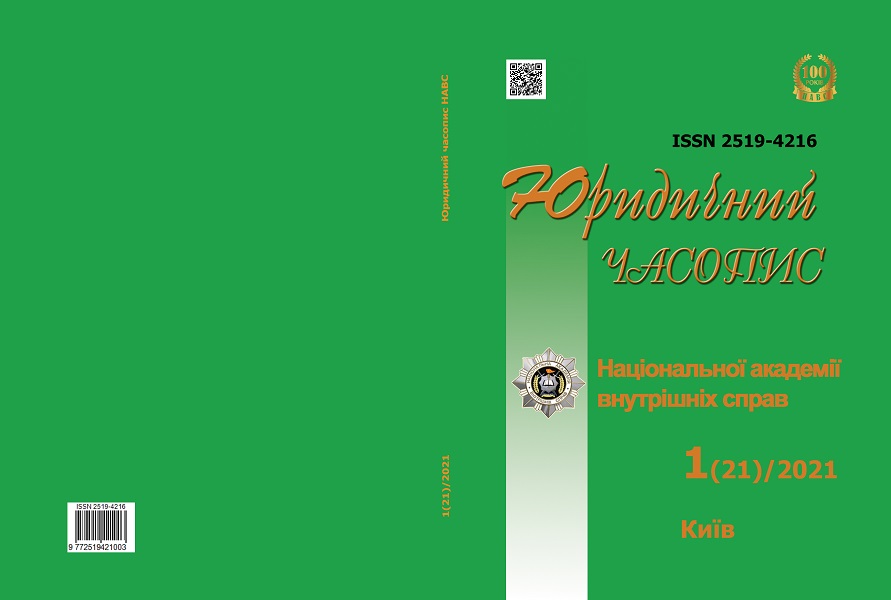World Experience Against Bullying
Abstract
The purpose of this article is to study the theoretical and applied aspects of bullying prevention in foreign countries and on the basis of a comprehensive analysis of foreign experience, to develop proposals for effective measures to prevent bullying in Ukraine. Methodology. Methodological tools are selected in accordance with the purpose, specifics of the object and subject of research. In the process of research the dialectical method of scientific knowledge of social and legal phenomena in their contradictions, development and changes is used, which allows to objectively assess the level and effectiveness of bullying prevention in Ukraine; formal-logical method, by means of which elements of the legal mechanism of violence prevention are revealed; comparative law method is used in the analysis of current legislation and international regulations. The theoretical basis of the publication were the works of domestic and foreign scientists on aspects of bullying prevention. The scientific novelty of the publication is that it outlines the main measures to prevent bullying in foreign countries. A number of recommendations have been proposed that can be used in precautionary measures for bullying and victim assistance. Conclusions. Given the catastrophic growth of this phenomenon in the country, there is an urgent need for constant updating of guidelines for teachers and psychologists to prevent bullying in schools. On the example of such countries as Sweden, Great Britain, Finland, the United States, Spain, Norway, Canada, Japan, it is necessary to introduce special programs in the field of educational activities, the purpose of which is to educate young people in the spirit of tolerance, democracy and human needs. attitude to their peers and other positive aspects. In tandem with numerous legal mechanisms, such an approach will make it possible to eradicate bullying not only in practice but also in the minds of Ukrainian society.
Keywords: bullying; anti-bullying work; victim; aggressor; foreign experience; bullying prevention.
Downloads
References
Букіна О. Боротьба з булінгом: досвід Норвегії. 2019. URL: http://osvmarker.com.ua/novini-osviti/2353/.
Булінг: зовнішність, поведінка, успіхи та статки родини – можуть стати причинами цькування дитини. Вінниця Ок. Всі новини Вінниці : [сайт]. URL: http://vinnitsaok.com.ua/archives/911830.
Charach, A., Pepler, D., Ziegler, S. Bullying at school: A Canadian perspective. Education Canada. Spring, 2005. 14 р.
Козін А. О. Щодо проблеми застосування в Україні зарубіжного досвіду організації протидії булінгу (цькуванню)). Науковий вісник публічного та приватного права. 2020. Вип. 1. С. 174–178. doi: https://doi.org/10.32844/2618-1258.2020.1.31.
Laura L. Finley. Encyclopedia of school crime and violence. 2011. URL: https://epdf.pub/encyclopedia-of-school-crime-and-violence.html.
Мар’яновська В. В. Булінг: вітчизняний та закордонний досвід. Review of transport economics and management. 2019. Вип. 2 (18). С. 147–154. doi: https://doi.org/10.15802/rtem.v18i2.190706.
Meaning оf «bully» in the English Dicteonary. British Columbia Ministry of Education. 1998. Р. 379. URL: https://dictionari.cambridge.org/dictionary/english/bully?q=buling#translation.
Молчанова Д. В., Новикова М. А. Противодействие школьному буллингу: анализ международного опыта. М. : НИУ ВШЭ, 2020. 72 с.
Миронюк Т. В., Запорожець А. К. Удосконалення заходів протидії булінгу в Україні. Науковий вісник Національної академії внутрішніх справ. 2019. № 3 (112). С. 21–28. doi: https://doi.org/10.33270/01191123.21.
Миськевич Т. Регулювання проблеми булінгу на законодавчому рівні: перші кроки України та світовий досвід. Громадська думка про правотворення. 2019. № 1 (166). С. 18–22. URL: http://nbuviap.gov.ua/images/ dumka/2019/1.pdf.
Roberge, G. D. From zero tolerance to early intervention: The evolution of school anti-bullying policy. Fall, 2012. Р. 1.
Ведернікова А. О. Американський досвід кримінально-правового регулювання булінгу. Вісник Луганського державного університету внутрішніх справ імені Е. О. Дідоренка. 2020. Вип. 2 (90). С. 90–102. doi: 10.33766/2524-0323.90.90-102.
Abstract views: 248 PDF Downloads: 480
Copyright (c) 2021 Law Magazine of the National Academy of Internal Affairs

This work is licensed under a Creative Commons Attribution-NonCommercial-NoDerivatives 4.0 International License.
- Authors reserve the right to authorship of their own work and transfer to the magazine the right of the first publication of this work under the terms of the Creative Commons Attribution License, which allows other persons to freely distribute published work with mandatory reference to authors of the original work and the first publication of an article in this magazine.
- Authors have the right to enter into separate additional agreements on non-exclusive dissemination of the work in the form in which it was published in the journal (for example, to post an article in the institution's repository or to publish as part of a monograph), provided that the link to the first publication of the work in this journal is maintained.
- The journal's policy allows and encourages the posting of articles by authors on the Internet (for example, in electronic storehouses of institutions or on personal websites), both before the submission of this manuscript to the editorial office and during its editorial processing, as this contributes to the creation of a productive scientific discussion and positively affects the efficiency and dynamics of citing the published work.




